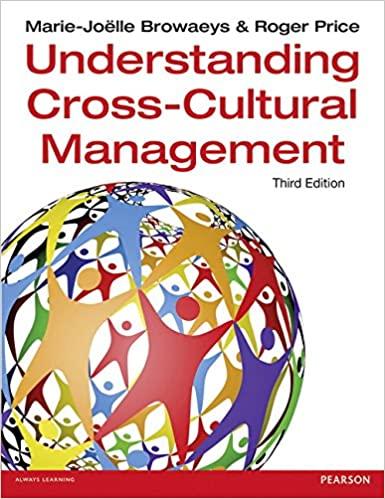One of my clients was a South Korean company established in the Netherlands. The sales targets that
Question:
One of my clients was a South Korean company established in the Netherlands. The sales targets that the company had been given by the headquarters in Seoul were very high. To help the company reach these targets, it hired an advertising agency. The agency went to work and came up with a total media campaign which the South Korean company accepted and allowed to be set in motion. One ingredient of the campaign was a simple but innovative slogan that quickly caught on.
The advertising agency continued the campaign, which appeared to maintain its success. The initial euphoria within the company, however, had evaporated. Its managers thought the agency’s bills were too high, not only because the agency had been working with them for two years, but also because they were suspicious about the actual hours that the agency was spending on producing the advertising. They knew it was difficult to check on the time needed to come up with brilliant ideas, but still they felt that the Dutch were taking advantage of the situation. As I discovered later, a comment which was frequently heard at the top of the company was: ‘You have to be careful with those Dutch.’
The Korean company started to withhold payments. The director of the Dutch agency saw this as a typical tactic of the Koreans to get lower prices. He shared the view held by some businesses that Koreans easily breach contracts, a perception that usually comes about because people are generally unaware of how Koreans interpret the word ‘trust’. Having tried to explain this to him, it was not really a surprise to hear from the Koreans that they intended to break their contract with the agency. I told them it could damage their name in the market if they did so, and reminded them that all the slogans used to promote their products remained the (intellectual) property of the advertising agency.
Well, the agency threatened to take the Korean company to court to recover the money it was owed. They did so, despite being eager to continue with the contract. Losing it would mean disaster for a company that had only started up a few months before getting the Korean contract.
A meeting took place between the two sides without my presence. During it the Koreans made it clear that they were not going to pay. The young manager representing the agency told the Koreans that they would not be allowed to use the slogans any more if the contract was terminated.
The Korean management called me in and asked me to help. I had a dilemma. It was in my clients’ interest to continue the contract. Breaking it would mean putting an end to the whole advertisement campaign that they needed so much (since they were new in the market). The Dutch had good arguments for the amounts they had charged and were really afraid of losing the contract. If the advertising agency started legal proceedings, the Koreans would have no chance of winning the case.
Questions
1. What exactly is the dilemma referred to in the last paragraph?
2. How would you describe the contrast between the South Koreans and the Dutch when they are doing business?
3. How do you think the dilemma could be resolved?
Step by Step Answer:

Understanding Cross Cultural Management
ISBN: 9781292015897
3rd Edition
Authors: Marie Joelle Browaeys, Roger Price





